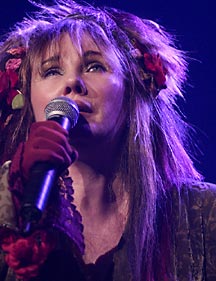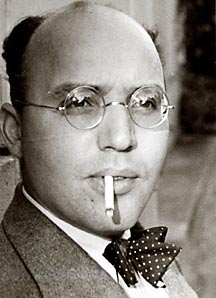Diva Diane Digs Weill by Réjean Beaucage
/ March 6, 2004
Version française...
 Diane Dufresne is often referred to as a
diva, a tribute to her powerful voice and gift for incarnating the
personalities in her songs. However, she is not the kind of diva that usually
performs before an orchestra. Her music falls mainly under the category of rock,
and her performances have filled Montreal's Olympic Stadium. Dufresne's upcoming
concert with the Orchestre Métropolitain du Grand Montréal is therefore
something of an unprecedented event. We talked to the rock diva about her part
in this concert. Diane Dufresne is often referred to as a
diva, a tribute to her powerful voice and gift for incarnating the
personalities in her songs. However, she is not the kind of diva that usually
performs before an orchestra. Her music falls mainly under the category of rock,
and her performances have filled Montreal's Olympic Stadium. Dufresne's upcoming
concert with the Orchestre Métropolitain du Grand Montréal is therefore
something of an unprecedented event. We talked to the rock diva about her part
in this concert.
LSM: You're embarking on a genuine
adventure.
Diane Dufresne: Yes, totally. An adventure that
requires sea legs, because it's a huge ship!
LSM: The experience is very different from
singing with a small group of musicians.
DD: Very different. I've done it at the Colisée in
Quebec City with the Orchestre symphonique de Québec (OSQ) conducted by Gilles
Ouellet in 1988, and at the Lanaudière Festival that same year with the
Orchestre Métropolitain. This was the Symphonique'n'roll show that we later gave
at the Maison des Arts in Créteil on the outskirts of Paris, with the Orchestre
symphonique d'Europe conducted by Olivier Holt, and also at Bunkamura Hall in
Tokyo in 1990, with the New Japan Philharmonic conducted by Gilles Ouellet. I
did another show with the OSQ more recently. It's really something to sing like
this, surrounded by such an orchestra. Also, the songs are all new for me, which
doesn't make things easy.
LSM: It's true that you usually sing songs
written for you, rather than look for works in the repertoire.
DD: I have done things from the classical
repertoire--[Rossini's] "Cat Duet" or extracts from La Traviata or
Mahler, but I used to say to the conductor, "I'll breathe before I choke for
lack of air!" because I haven't the technique of a classical singer. A rock
voice requires another breathing technique. It's different, but the discipline
is good for you. I'm having a first run-through with the orchestra Monday,
February 23. The musicians are being kind enough to record this first rehearsal
so that I can continue to rehearse without them, before meeting them again a few
days before the concert. Doing a program like this means you have to be really
fired up. I think I am, but after the concert I'll have to take the time to cool
down!
LSM: Yannick Nézet-Séguin told me that you were
a bit surprised that he thought of you for this concert, although it seems a
perfectly natural choice.
DD: Yes, I was surprised. I liked Kurt Weill's
music, which I'd heard sung by Juliette Gréco and Pia Colombo, Catherine Sauvage
and of course Pauline Julien. These are women I admire who have taught me a lot,
but I didn't see myself doing this particular repertoire. That's why I was
surprised when Yannick suggested it. But it was a nice surprise. I've never gone
for what is easy, but I have to admit that this is a pretty tall order. Simon
Leclerc's arrangements are absolutely sumptuous. I've imagined a plot, something
for a mini-opera that would unify the people in the songs. They're not the same
from one song to the next, but the same types, vaguely marginal. Weill was a
real genius--his music is so good at transmitting the intention and emotion of
Brecht's words, or Boris Vian's translations, that you don't need to force the
feeling when you're singing.
LSM: Do you get on well with the
conductor? 
DD: I've only met him once, and we've also talked
on the telephone. I think he's a very busy man! As for me, I'm more of a loner;
I like working on my own. I found that he was as enthusiastic as a child, which
is very good. People tend to think that the world of rock is very turned on, but
in my view you see this most in classical music. I was delighted to find that he
wasn't afraid to ask me to take part, even though I don't generally appear in
this type of concert. I'm always ready to work which someone like
him--intelligent, highly competent, and gifted with great talent... and that
joy. He's filled with joy, and that's what motivated me to accept the
invitation, which I might not have done with someone else. It's a pleasure to
share with him the experience of making the public a little more familiar with
this music.
[translation: Jane Brierley]
photo caption: Kurt Weill en
1934
Version française... | 

